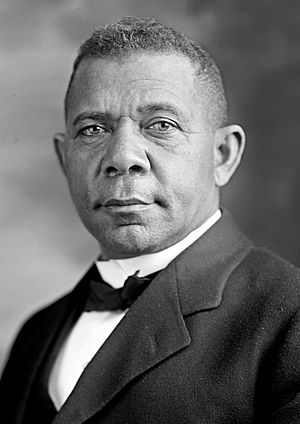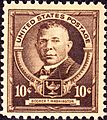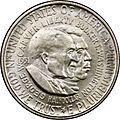Booker T. Washington facts for kids
Quick facts for kids
Booker T. Washington
|
|
|---|---|

Booker T. Washington in 1905
|
|
| Born |
Booker Taliaferro Washington
April 5, 1856 Hale's Ford, Virginia, U.S.
|
| Died | November 14, 1915 (aged 59) Tuskegee, Alabama, U.S.
|
| Resting place | Tuskegee University |
| Alma mater | Hampton Normal and Agricultural Institute Wayland Seminary |
| Occupation |
|
| Political party | Republican |
| Spouse(s) | Fannie N. Smith (1882–1884, her death) Olivia A. Davidson (1886–1889, her death) Margaret Murray (1893–1915, his death) |
| Children | 3 |
| Signature | |
Booker T. Washington (born April 5, 1856 – died November 14, 1915) was an important American educator, writer, and speaker. He also advised several presidents of the United States. From 1890 to 1915, he was a leading voice for African Americans.
Booker T. Washington was born into slavery. He became a key leader for former slaves and their children. During his time, many Black people in the South faced unfair laws called Jim Crow laws. These laws kept Black and white people separate and made it hard for Black people to vote. Washington worked to improve life for African Americans during this challenging time.
Contents
Early Life of Booker T. Washington
Booker was born into slavery in Virginia. His mother, Jane, was an enslaved African-American woman. He never knew his exact birth date. He was just called "Booker" when he was young.
Booker later wrote about how hard life was under slavery. His family rarely ate together. Meals were often just scraps of food given out quickly.
When Booker was nine, he and his family became free. This happened because of the Emancipation Proclamation. U.S. troops came to their area in Virginia.
After gaining freedom, his mother took the family to West Virginia. They joined her husband, Washington Ferguson, who had escaped slavery earlier. Booker, who couldn't read, began to teach himself. He also went to school for the first time.
At school, Booker needed a last name for registration. He chose "Washington" after his stepfather. Later, he learned his mother had given him the middle name "Taliaferro" at birth. He then used the full name Booker Taliaferro Washington for the rest of his life.
Higher Education and Learning
Booker T. Washington worked in salt factories and coal mines in West Virginia. He saved money for several years. Then, he traveled to the Hampton Institute in Virginia. This school was created to educate formerly enslaved people. He worked there to pay for his studies.
Later, in 1878, he also attended Wayland Seminary in Washington, D.C. He believed deeply in the power of education.
Booker T. Washington's Career
Washington was a strong supporter of African-American businesses. He helped start the National Negro Business League. His main work was at the Tuskegee Institute in Alabama. This school helped train Black students in useful skills. He was the principal of Tuskegee Institute.
In 1895, Washington gave a famous speech called the "Atlanta Compromise". He suggested that Black people should focus on getting an education and starting businesses. He believed this would help them gain economic strength and respect. He thought this was a better path than directly fighting against unfair Jim Crow laws and voting restrictions at that time.
Washington worked with many people, including Black community leaders and white supporters. His goal was to build economic strength and pride within the Black community. He believed in "self-help" and education. While he spoke about working within the system, he also secretly supported legal challenges against segregation.
Washington was a powerful figure. He could influence politicians and raise money for his causes. He even advised presidents. However, some Black leaders disagreed with his approach. W. E. B. Du Bois and others felt Washington's ideas were too accepting of unfair treatment. They believed in fighting directly for political rights.
These activists formed the National Association for the Advancement of Colored People (NAACP). They worked for political change and built support among white allies in the North. Decades after Washington's death, the Civil Rights Movement of the 1950s took a more active approach. This movement used new groups like the Congress of Racial Equality (CORE) and the Student Nonviolent Coordinating Committee (SNCC)].
Visit to the President
Booker T. Washington was invited to dinner by President Theodore Roosevelt. The President wanted Washington to advise him on issues related to race. This was a big deal because no African American had been asked to dine at the White House before. Some newspapers published racist poems about a Black person dining there.
Death of Booker T. Washington
Booker T. Washington passed away on November 14, 1915. He died from kidney failure caused by high blood pressure. His funeral was held at the Tuskegee Institute Chapel. Nearly 8,000 people attended. He was buried in the Tuskegee University Campus Cemetery.
Honors and Memorials
Booker T. Washington received many honors for his work.
- In 1896, Harvard University gave him an honorary master's degree.
- Later, Dartmouth College gave him an honorary doctorate degree.
At the center of Tuskegee University, a monument to Booker T. Washington was built in 1922. It is called Lifting the Veil. The monument has a special message: "He lifted the veil of ignorance from his people and pointed the way to progress through education and industry."
In 1942, a liberty ship was named the Booker T. Washington in his honor. This was the first large ocean ship named after an African American.
In 1946, he was honored on the first coin to feature an African American. This was the Booker T. Washington Memorial half dollar. It was made by the United States until 1951.
On April 5, 1956, the house where he was born in Virginia became the Booker T. Washington National Monument.
A state park in Chattanooga, Tennessee, is named after him. Also, a bridge over the Hampton River near Hampton University bears his name.
In 1984, Hampton University created a Booker T. Washington Memorial on campus. It connects him to the historic Emancipation Oak, a symbol of Black achievement in education.
Interesting Facts about Booker T. Washington
- Booker T. Washington was born into slavery and never knew his exact birth date.
- He advised several presidents of the United States.
- He was one of the founders of the National Negro Business League.
- Booker worked in salt factories and coal mines for years to earn money.
- His middle name “Taliaferro” is Italian. He chose the last name Washington when he first went to school.
- Booker T. Washington was married three times and had three children: Portia M. Washington, Booker T. Washington Jr., and Ernest Davidson Washington.
- He strongly believed that education was important for African Americans to succeed and become independent.
- His autobiography, Up from Slavery, first published in 1901, is still widely read today.
- He was the first African American to be featured on a postage stamp.
Images for kids
-
The Oaks – Booker T. Washington's house at Tuskegee University
-
Washington circa 1895, by Frances Benjamin Johnston
-
Washington's wealthy friends included Andrew Carnegie and Robert Curtis Ogden, seen here in 1906 while visiting Tuskegee Institute.
-
Handbill from 1909 tour of southern Virginia and West Virginia.
-
Booker Washington and Theodore Roosevelt at Tuskegee Institute, 1905
-
Sculpture of Booker T. Washington at the National Portrait Gallery in Washington, D.C..
See also
 In Spanish: Booker T. Washington para niños
In Spanish: Booker T. Washington para niños
 | Audre Lorde |
 | John Berry Meachum |
 | Ferdinand Lee Barnett |












